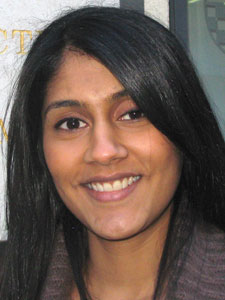Esha Massand
Birkbeck, University of London
www.bbk.ac.uk/psychology/
What does your research focus on?
My research focuses on neurodevelopmental disorders such as Autism Spectrum Disorder (ASD) and Down’s syndrome. I am interested in the impact of these disorders on developmental trajectories, particularly as it concerns cognitive abilities. In my research on ASD I have shown that even when overt behaviours are similar to typically developing controls, those with ASD display different underlying brain processes. In my most recent research, I have started to investigate the links between Down’s syndrome and Alzheimer’s disease. I will approach this topic with teams of geneticists, psychiatrists, and neuroscientists to answer our questions about the over-expression of the APP gene on chromosome 21, individual differences in the development of learning disabilities in infants and children with Down’s syndrome, the processes involved in cognitive decline with aging, and the relationship between Down’s syndrome and Alzheimer’s disease — including the identification of risk markers and preventative treatment.
What drew you to this line of research and why is it exciting to you?
I have always been intrigued by human development, cognition, learning, and memory. Research focused on atypical development is particularly exciting as it provides a perspective in which to understand not only the disorder, but also typical development. I am drawn into this line of research because of its potential to identify early risk markers for these individuals, and the possibility to develop very early interventions in infancy to channel their development closer to the typical trajectory.
Who were/are your mentors or scientific influences?
I have been fortunate to have had excellent mentors throughout my PhD and postdoctoral training. I completed my PhD under the supervision of Dermot Bowler at City University London. Professor Bowler inspired me to be daring in my choice of experimental methodology. He taught me the highest standard of scientific methodology and ensured there were excellent training opportunities to enhance the breadth of my knowledge and skills during my PhD. Part of this training included an international exchange in Montreal, Canada, where I was taught to use electrophysiology by Boutheina Jemel at the Hôpital Rivière-des-Prairies (Montreal, 2007). Dr. Jemel continued to inspire me with her use of detailed and sophisticated research methodology and data analysis to tackle important research questions. Following completion of my thesis, I moved to Seattle, Washington, to continue my training in electrophysiology as a Postdoctoral Fellow at the Center on Human Development and Disability with Sara Webb. Dr. Webb provided excellent, gentle guidance and mentorship for me to complete a program of research with multiple age cohorts of individuals with autism. Dr. Webb has taught me the importance of proficiency of interactions with different contributing disciplines in large-scale studies.
I am exceptionally enthusiastic about the current phase of my career and my current mentor, Annette Karmiloff-Smith at the Centre on Brain and Cognitive Development, Birkbeck, University of London. This experience is truly a dream come true, and I am very grateful to have excellent mentors that have provided exciting collaborations and are strong aspirational role models.
What’s your future research agenda?
I am currently working at the Centre on Brain and Cognitive Development, Birkbeck, University of London, on a project that aims to help us better understand the links between Down’s syndrome and Alzheimer’s disease. Because of their brain pathology of plaques and tangles, people with Down’s syndrome are much more likely than the general population to develop Alzheimer’s disease, yet only 50% go on to display clinical symptoms. So we are aiming to discover both the risk and protective factors. I am collaborating with teams of geneticists, psychiatrists and neuroscientists at UCL’s Institute of Neurology, the Blizard Institute at Queen Mary, University of London, and the National Institute for Medical Research (NIMR) to answer questions such as: What are the very early signs of learning disabilities in infants with Down’s syndrome and how do they develop?; What are the processes involved with the cognitive decline that occurs with age in Down’s syndrome?; Why do some people with Down’s syndrome go on to get dementia and others do not, despite having Alzheimer’s brain pathology? We are looking for markers that can identify people with Down’s syndrome who will go on to develop dementia, to identify both risk and protective markers during infancy and target preventative treatment. We hope our insights will lead to novel treatments for early Alzheimer’s diagnosis, and intervention/ treatments that will benefit those people diagnosed with Down’s, as well as the general population. Together with the other labs listed above, we will enhance our understanding of the relationship between Down’s syndrome and Alzheimer’s disease by incorporating large age cohorts and integrating current understanding within research domains such as human cognitive development, aging, neurobiology, genetics, and cellular modeling. We will also use mouse models to address important research questions.
What publication are you most proud of?
I am very proud of my most recent article in the Journal of Autism and Developmental Disorders entitled, “ERP Correlates of Recognition Memory in Autism Spectrum Disorder” (in press; DOI: 10.1007/s10803-012-1755-x: PMID 23307419). It was the first study to use event-related potentials (ERPs) to enhance our understanding of well-established memory atypicalities in high-functioning adults with ASD and contributes to our understanding of brain-behavior relations in this condition.






APS regularly opens certain online articles for discussion on our website. Effective February 2021, you must be a logged-in APS member to post comments. By posting a comment, you agree to our Community Guidelines and the display of your profile information, including your name and affiliation. Any opinions, findings, conclusions, or recommendations present in article comments are those of the writers and do not necessarily reflect the views of APS or the article’s author. For more information, please see our Community Guidelines.
Please login with your APS account to comment.